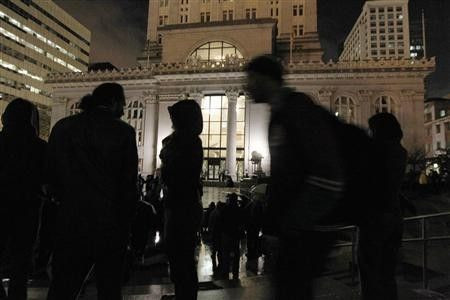Anti-Wall Street protesters dig in against police

Tensions were rising at anti-Wall Street protests in three western U.S. cities on Friday as demonstrators in Portland, Salt Lake City and Oakland defied orders by police to dismantle their camps.
In Portland, police said they had received reports that protesters were digging a reinforced hole and fashioning make-shift weapons out of wood and nails after Mayor Sam Adams gave them until midnight on Saturday to clear out of two downtown parks.
Police said they believed Occupy Portland organizers had also put out a call for reinforcements from Oakland, Seattle and San Francisco as they prepared for a confrontation.
There may even be as many as 150 anarchists who will arrive soon, Portland police said in a written statement.
There is information that people may be in the trees during a police action and that there are people who are attempting to obtain a large number of gas masks, the statement said.
Occupy Portland organizers, who say their encampment numbers between 500 and 800 people, denied that they were making weapons or recruiting anarchists for a pitched battle and insisted that they were a nonviolent movement.
Still, while a few protesters trickled out of the two main camps in downtown Portland as the deadline approached, hundreds remained hunkered down in their tents on a chilly Friday night in the Pacific northwest.
In Salt Lake City, meanwhile, protest organizers vowed to resist an order by police chief Chris Burbank clear out of Pioneer Park in downtown by 30 minutes after sundown Saturday.
Burbank said he had had enough after an unidentified and possibly homeless man was found dead in his tent there, possibly of carbon monoxide poisoning from a propane heater and a drug overdose.
'I'M GOING TO FIGHT'
We can no longer tolerate individuals camping on our streets. We can no longer care for individuals camping here, Burbank told protesters. I commit to work with you to find avenues that you can express your free speech. It just can't be done through camping in our streets and in our parks.
But protest organizer Jesse Fruwirth told Reuters that a number of protest members were willing to remain in the park and face arrest on Saturday night if the city could not be persuaded to let them stay.
We were caught off guard this afternoon. We believed we had a cooperative relationship with the city, he said following an impromptu press conference and candlelight vigil.
Homeless protester Nathan Clark, meanwhile, told Reuters he had found a safe haven in the park after years in foster homes and on the streets and us being shut down isn't cool.
I'm staying here, Clark, 18, said. I'm going to fight this cause. I'm going to stay my ground.
And in Oakland, where police and protesters have clashed several times over the past few weeks, organizers said they intended to stay in Frank Ogawa Plaza near city hall despite increasing pressure by authorities.
On Friday night, police handed out fliers at the Occupy Oakland encampment putting demonstrators on notice that they were violating the law by camping and having open fires.
The warnings came one day after a man was shot to death not far from the plaza, prompting the Oakland police officers union to release an open letter asking protesters to pack up and leave.
But protesters, who say the shooting was unrelated to them, took shelter in their tents on Friday night as a steady rain fell over the Bay Area, showing no signs of leaving.
Police forcibly removed tents and drove protesters out of Frank Ogawa Plaza on October 25, only for demonstrators to return later to reclaim the public square outside City Hall.
Police and protesters clashed again the following week after a day of largely peaceful citywide rallies and marches that forced a brief shutdown of the Port of Oakland.
© Copyright Thomson Reuters 2024. All rights reserved.





















